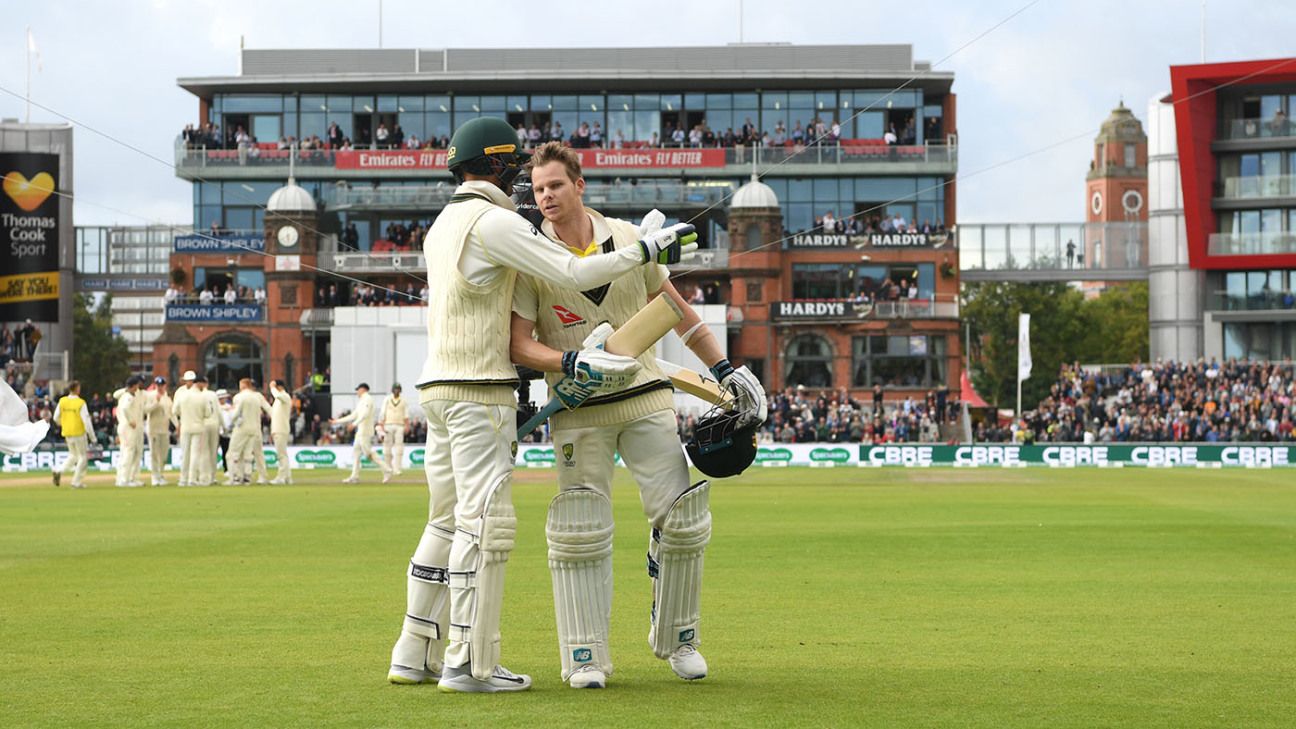
Believe it or not, Steven Smith batted badly today, at least to start with.
His first couple of overs were redolent of those passages in which, as he has described it, he forgets how to hold the bat. There was an edge short of the slips first ball, a couple of balls beating the bat, an inside edge past the stumps, and a dropped return catch by Jofra Archer when Smith bunted a full toss back towards the bowler who by the end of the day was still to dismiss him in a Test match.
The fact that missed chance strolled on down the ground to the boundary, meaning Smith had still scored 10 runs from those ropey first two overs, rather suggested that this would be his day. He had, on day one, already proven that there were to be no after-effects from his Lord's concussion and Headingley absence, save for a change in bouncer evasion technique against Archer and the successful adaptation to wearing a stem guard on the back of his helmet. In this he had plenty of help from Marnus Labuschagne, during a stand of 116 that gave Australia a foothold.
But more needed to be done on day two, offering as it did far less likelihood of rain breaks, against an England bowling attack of uncertain stamina if they could be ground down. Smith, beyond his early jitters, returned to the combination of calm combat against each ball and exaggerated "eccentric stuff", as he calls it, after. What he needed more than anything were batting partners, not something that he had been able to find in ready supply so far.
Early in the day, the major obstacles for Australia's left-handed batsmen were again on display, as Stuart Broad bent the ball fiendishly away from the bat after angling it in from around the wicket. Both Travis Head and Matthew Wade had plenty of now familiar difficulties against this angle of attack, and while they were there a wicket never seemed far away. Vitally, though, Head and Wade each hung around long enough for stands of 39 and 41, not much but enough to prevent England from generating the rush of wickets they needed.
And even though Wade's unsuccessful attempt to hammer Jack Leach into Stretford ended with a skied catch to Joe Root and much gnashing of teeth about his choice of shot - not least among those who may have preferred the retention of Usman Khawaja - his innings allowed Tim Paine to walk to the wicket facing spin and an old ball. In averaging little more than 12 for the series so far, Paine had made a point of spending extra time on his batting leading into this match, after the fashion of none other than Smith.
On match eve he was the last man in the nets for Australia, working against left-arm spin throwdowns from the assistant coach Sridharan Sriram. They returned to the same spot bright and early the following morning, before the rest of the team had even arrived on the bus from central Manchester, trying to find the key to a better score than those of 5, 34, 23, 4, 11 and 0 he had managed over the first three Tests.
What was soon clear, for both Paine and Smith, was that they had the opportunity to put the match more or less beyond England in terms of victory. The home side's bowlers were looking increasingly sloppy, and fatigued, the fielders similar, while Ben Stokes was fighting not only a tired body but a sore bowling shoulder. As a result, their cricket was far from England's most exacting this series, personified by how Archer's speed and venom was demonstrably down, frustrated too by the fact that his short ball was being much better read by Smith.
Here could also be seen the benefits Smith reaped from how the Australians had acquitted themselves without him at Headingley, putting 30-odd more overs into both Archer and Broad to contribute to an overall series ledger that always looked likely to favour Australia's deeper battery of pace options. If the conditions at Lord's had been more favourable for Archer against Smith, then so too had his preparation. By the time their battle was rejoined, Smith was facing a bowler experiencing the brutality of a long Test series for the first time in his life.
It would not, of course, have been this bewitching series without a moment of sliding doors, leaving both sides pondering the consequences. They arrived when Paine was dropped by Jason Roy in the slips immediately after the interval, and again when Smith, having glided to a third century of the series before lunch, threw his hands at a Leach delivery that turned away nicely, drawing the edge straight to Stokes at slip.
Stokes, already frustrated by how the day had gone, hurled the ball angrily into the ground by way of celebration; he soon had cause to repeat the act, only with a little more anger. When the umpires went upstairs to check, there was nothing of Leach's front foot behind the crease either raised or grounded, allowing Smith the fortune of turning on his heels and walking back to re-mark his guard.
That moment was both sapping for England and restorative for Paine and Smith, who took their stand to 145, the highest of the series, and underlined how Australia's captain generally deals in key partnerships as opposed to large individual scores. When he finally fell for 57, first ball after tea, it was Paine's 30th consecutive score of 50 or more in first-class matches that had not got as far as three figures. Annoying as that may be for him, his contribution was exactly what Smith had needed.
All that remained was for Smith, equal parts quirk and command, to stride to the third Ashes double century of his career - only Sir Donald Bradman (eight) and Wally Hammond (four) have more. His grinding down of England's bowlers, interspersed with the regular flourishes of 24 boundaries and two sixes, served to soften up the ground so effectively that Mitchell Starc was able to hammer a brisk half-century in the closing overs of Australia's innings.
Smith reckoned that Paine was at his best as a batsman when he was trying to score as much as survive.
"We kept talking in the middle about building that partnership, just keep trying to put as many runs on the board as possible in that partnership," Smith said.
"I thought Tim played exceptionally well today. He came out with a really positive mind-set, put away the loose balls, defended the good balls, left the balls that he had to leave and was really disciplined. But he had that positive mind-set of really hitting the ball, and when Tim's got that, that's when he's batting at his best. That was a good partnership.
"And then Starcy as well came out and did the same. He hit the middle of the bat a lot, played some beautiful straight drives in the air and along the ground and that's pleasing to see. We've seen how lower-order runs have been in big Ashes games. The fact that he's been able to work on his batting during the three games he hasn't played in so far, to come out and do that just shows a sign of someone who wants to get better and play their part for the team."
Save for Bradman, no-one can boast of more Test runs after 121 innings than Smith's 6,678, a tally that for now has granted him the neat average of 64.64. His genius has been undimmed by the Lord's blow, and perhaps even enhanced. His dealing with the Archer short ball has improved markedly, and he was able to find enormous reserves of concentration that if anything would have been refreshed by the time out of Leeds.
What Smith needed most, however, were allies. And in this innings, much to Australia's relief, he was able to find them. The Ashes, once again, look close to their keeping.















 Phone: (800) 737. 6040
Phone: (800) 737. 6040 Fax: (800) 825 5558
Fax: (800) 825 5558 Website:
Website:  Email:
Email: 






